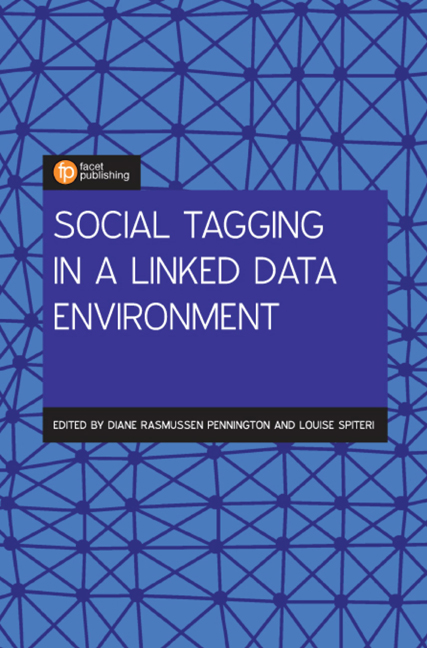Book contents
- Frontmatter
- Contents
- List of figures and tables
- Contributors
- 1 Introduction: the continuing evolution of social tagging
- 2 Tagging the semantic web: combining Web 2.0 and Web 3.0
- 3 Social tags for linked data with Resource Description Framework (RDF)
- 4 Social tagging and public policy
- 5 Hashtags and library discovery systems
- 6 Social information discoverability in Facebook groups: the need for linked data strategies
- 7 #FandomCommunication: how online fandom utilises tagging and folksonomy
- 8 Keys to their own voices: social tags for a dementia ontology as a human right
- 9 Social tagging and the enterprise: an analysis of social tagging in the workplace
- 10 Use and effectiveness of social tagging recommender systems
- Index
4 - Social tagging and public policy
Published online by Cambridge University Press: 01 June 2019
- Frontmatter
- Contents
- List of figures and tables
- Contributors
- 1 Introduction: the continuing evolution of social tagging
- 2 Tagging the semantic web: combining Web 2.0 and Web 3.0
- 3 Social tags for linked data with Resource Description Framework (RDF)
- 4 Social tagging and public policy
- 5 Hashtags and library discovery systems
- 6 Social information discoverability in Facebook groups: the need for linked data strategies
- 7 #FandomCommunication: how online fandom utilises tagging and folksonomy
- 8 Keys to their own voices: social tags for a dementia ontology as a human right
- 9 Social tagging and the enterprise: an analysis of social tagging in the workplace
- 10 Use and effectiveness of social tagging recommender systems
- Index
Summary
Introduction
Recognising the importance of the diffusion of ideas and learning to policy change, policymakers have utilised social tagging to pressure governments to propose new legislation or forestall existing bills (Ems, 2014; Jeffares, 2014; Saxton et al., 2015). Among the many examples seen in the last decade include the use of Twitter by the Chicago Health Departments to discourage electronic cigarettes (Harris et al., 2014), by politicians to frame healthcare (e.g. #Obamacare) (Hemphill, Culotta and Heston, 2013) or to protest a lack of action on climate change (Segerberg and Bennett, 2011). This chapter will focus on the connection between social tagging as it is understood in the online environment and its connection to the apparatus of the state. Research on the use of social tags for identifying important legislation, promoting scientific knowledge or consulting the public is a growing yet uncertain area of study (Harris et al., 2014; Jeffares, 2014; Kapp, Hensel and Schnoring, 2015; Shapiro and Hemphill, 2014, 2017). Still, the potential of the internet to help bridge the gap between citizens and the state continues to be both an aspiration and a disappointment for the field of internet governance.
Social tagging in information science refers to ‘the practice of publicly labeling or categorising resources in a shared, on-line environment’ (Trant, 2009, 1). For sociologists, the novelty of social tagging lies in its public nature compared to more private forms of coding in sociological field work (see Postill and Pink, 2012), but for political scientists the public naming of resources is not new at all. Removing the term online from this definition does not erase a wide array of social organization that occurs on a daily basis. The rather arbitrary naming of items in the budgeting process of a government (e.g. for clean technology), in particular, involves public labelling and categorising of resources, conducted by members of affected organizations, political leaders, policy-makers and, in some cases, individuals with unique interest or power in the particular policy area.
Social tagging itself is not a new process and is closely connected to the role of institutions in public life. In policy theory, institutions refer to systems of formal and informal rules and routines in a society that have accumulated over time.
- Type
- Chapter
- Information
- Social Tagging for Linking Data Across Environments , pp. 59 - 88Publisher: FacetPrint publication year: 2018



